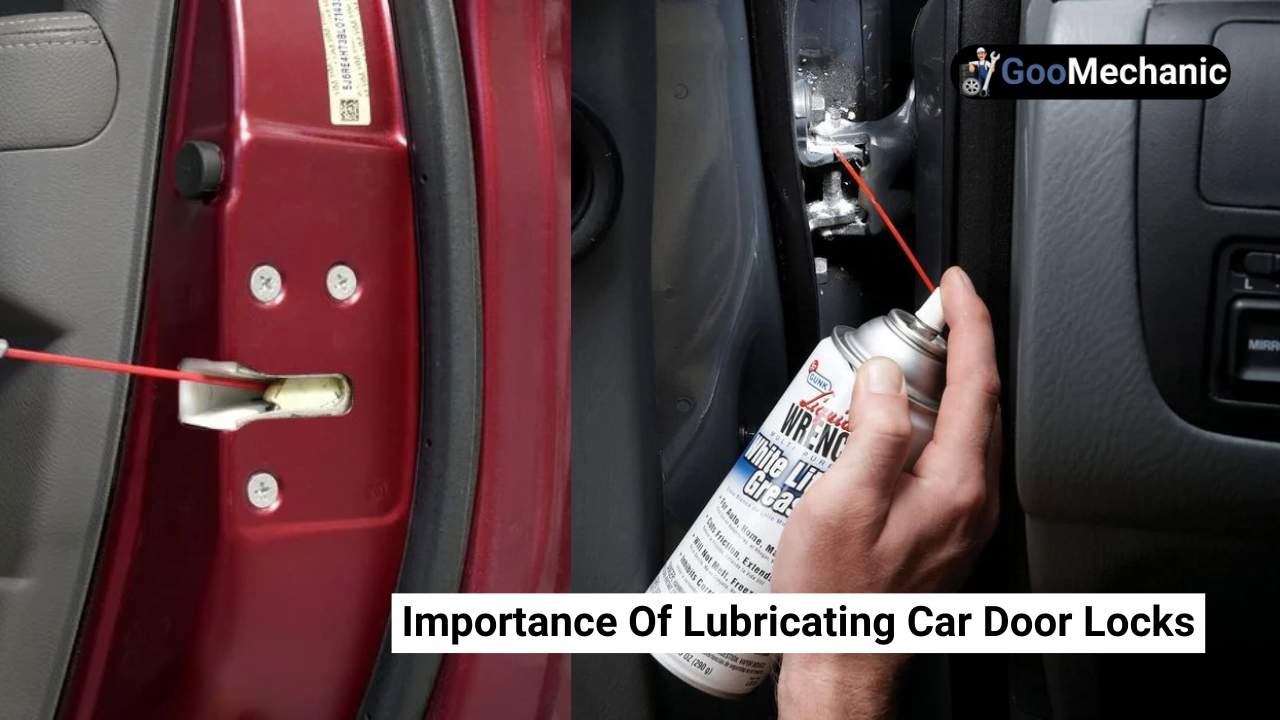A silicone-based lubricant is ideal for car door locks. It prevents rust and ensures smooth operation.
Car door locks can become stiff and difficult to operate over time. This can result from dirt, rust, and exposure to harsh weather conditions. Regular maintenance with the right lubricant keeps them functioning smoothly. Silicone-based lubricants are excellent for this purpose.
They resist water, prevent rust, and ensure that the locks operate smoothly. Unlike oil-based lubricants, silicone does not attract dust and grime. This makes it a superior choice for maintaining car door locks. Applying a silicone lubricant is simple and can save you from costly repairs. Keep your car door locks in top condition with regular lubrication.
Importance Of Lubricating Car Door Locks

Car door locks are essential for vehicle security and convenience. Regular maintenance can prolong their lifespan and improve performance. One crucial aspect of maintenance is lubrication. Lubricating car door locks keeps them functioning smoothly and prevents various issues.
Preventing Wear And Tear
Using a lubricant on your car door locks can significantly reduce wear and tear. Over time, dirt and debris can accumulate inside the lock mechanism. This buildup causes friction and eventually leads to damage. Applying a good lubricant helps keep the internal components clean and free of debris.
Lubrication forms a protective layer that reduces friction between moving parts. This layer minimizes wear and extends the life of the lock. Regular lubrication ensures that the locks operate smoothly without grinding or sticking. It also prevents parts from wearing out prematurely.
Enhancing Lock Performance
Lubricating car door locks enhances overall performance. A well-lubricated lock is easier to operate. It makes locking and unlocking doors effortless. This is especially important during cold weather when locks can freeze.
Proper lubrication helps maintain the internal alignment of the lock mechanism. This alignment ensures that the key turns smoothly without resistance. Improved performance not only makes the lock more reliable but also provides better security for your vehicle.
In summary, regular lubrication of car door locks is essential. It prevents wear and tear, ensures smooth operation, and enhances lock performance. Always use a lubricant that is specifically designed for car locks to achieve the best results.
Types Of Lubricants

Using the right lubricant ensures your car door locks work smoothly. There are various types of lubricants. Each has unique features and benefits. Let’s explore the most common types.
Graphite Powder
Graphite powder is a dry lubricant. It reduces friction without leaving a greasy residue. This makes it ideal for car door locks. It also withstands extreme temperatures. To apply, sprinkle a small amount into the lock. Then, insert and turn your key to distribute.
Silicone Spray
Silicone spray is a popular choice for many car owners. It provides a thin, protective layer. This prevents rust and corrosion. Silicone spray is also water-resistant. This makes it perfect for outdoor use. Simply spray into the lock and move the key around.
White Lithium Grease
White lithium grease offers long-lasting lubrication. It’s thicker than other lubricants. This makes it ideal for high-use areas. It also provides protection against moisture. Apply a small amount to the key. Insert the key into the lock and turn it to distribute the grease.
Choosing The Right Lubricant
Choosing the right lubricant for your car door locks is vital. It ensures smooth operation and longevity. Let’s explore some key factors to consider.
Climate Considerations
Climate affects how lubricants perform. In cold climates, use a lubricant that won’t freeze. Freezing can jam the lock. In hot climates, use a lubricant that won’t evaporate quickly. This keeps the lock working smoothly.
Compatibility With Lock Material
Locks can be made of different materials. Ensure the lubricant is compatible with the lock material. Some lubricants can corrode certain metals. Check the lock’s material before choosing a lubricant. Common lock materials include steel, brass, and aluminum.
| Lock Material | Recommended Lubricant |
|---|---|
| Steel | Graphite or Teflon-based lubricant |
| Brass | Silicone-based lubricant |
| Aluminum | Dry lubricants like graphite |
- Graphite lubricants are good for most climates.
- Teflon lubricants provide long-lasting protection.
- Silicone lubricants are excellent in wet conditions.
Tools Needed For Lubrication
Proper lubrication of car door locks ensures smooth operation and longevity. Using the right tools is essential for effective lubrication. Below, we outline the basic and advanced tools required for this task.
Basic Tools
The basic tools are essential for every car owner. These tools help in maintaining and lubricating car door locks.
- Lubricant Spray: A can of WD-40 or silicone spray.
- Cloth: Use a clean, lint-free cloth to wipe off excess lubricant.
- Key: The car key helps in distributing the lubricant inside the lock.
These basic tools are simple and easy to use. They ensure the lock functions smoothly.
Advanced Tools
For a more thorough lubrication process, advanced tools might be necessary. These tools provide deeper cleaning and lubrication.
- Graphite Powder: Ideal for dry lubrication, especially in cold climates.
- Needle Oiler: Helps in applying lubricant precisely.
- Compressed Air: Used to blow out dirt and debris from the lock.
- Small Brushes: Useful for cleaning tight spaces within the lock.
Advanced tools offer a more detailed and effective lubrication process. They ensure the lock remains functional for a longer period.
Step-by-step Lubrication Process

Car door locks can get sticky over time. Keeping them lubricated ensures smooth operation. Follow this simple guide to lubricate your car door locks easily.
Preparing The Lock
Before you start, gather your materials. You will need:
- Graphite powder or silicone spray
- Clean rag or paper towel
- Small brush or toothbrush
First, clean the lock. Use the brush to remove dirt and debris. Wipe the lock with the clean rag. Ensure the keyhole is clear of any obstruction.
Applying The Lubricant
Choose the right lubricant. Graphite powder or silicone spray works best. Avoid using oil-based lubricants. These can attract dirt and cause more problems.
For graphite powder:
- Insert the tip of the powder tube into the keyhole.
- Gently squeeze to release a small amount.
- Insert the key and turn it several times to distribute.
For silicone spray:
- Attach the straw to the spray nozzle.
- Insert the straw into the keyhole.
- Spray a short burst of lubricant.
- Insert the key and turn it several times to spread the lubricant.
Testing The Lock
After applying the lubricant, test the lock:
- Insert and remove the key multiple times.
- Turn the key to lock and unlock the door.
- Ensure the lock works smoothly without sticking.
If the lock still feels sticky, repeat the lubrication process. Regular maintenance will keep your locks working efficiently.
Common Mistakes To Avoid
Keeping your car door locks well-lubricated is crucial for smooth operation. But many make mistakes that can cause more harm than good. Avoid these common pitfalls to ensure your car locks last longer and function properly.
Over-lubrication
Over-lubrication can be just as harmful as neglecting lubrication. Using too much lubricant can attract dirt and grime. This buildup can clog your car door lock over time.
To avoid this, apply a small amount of lubricant. Wipe off any excess with a clean cloth. It should be enough to coat the internal mechanisms lightly.
Using The Wrong Lubricant
Using the wrong type of lubricant can damage your car door locks. Graphite powder is an excellent choice for car locks. It doesn’t attract dirt, keeping your locks cleaner for longer.
Avoid oil-based lubricants. These can become sticky and attract dust. Silicone spray can also be a good option. It’s effective and doesn’t create a mess.
Here’s a quick comparison of lubricants:
| Type of Lubricant | Advantages | Disadvantages |
|---|---|---|
| Graphite Powder | Doesn’t attract dirt | Can be messy to apply |
| Oil-Based Lubricant | Easy to apply | Attracts dirt and dust |
| Silicone Spray | Clean application | Can wash away easily |
Stick to the recommended types of lubricants. This will help your car door locks function smoothly for a longer period.
Maintenance Tips
Maintaining your car door locks is crucial. Proper lubrication ensures they function smoothly. Avoid getting stuck out of your car by following these tips.
Regular Lubrication Schedule
Set a regular lubrication schedule. Every three months is ideal.
- Check the locks for dirt and debris.
- Use a high-quality lubricant.
- Spray the lubricant into the lock mechanism.
- Move the key in and out to distribute the lubricant.
Stick to this schedule. It keeps your car locks in top shape.
Signs Your Lock Needs Lubrication
There are signs your lock needs lubrication:
- Difficult to turn the key.
- Key gets stuck in the lock.
- Lock feels gritty or rough.
- Unusual noises when turning the key.
If you notice any of these signs, lubricate your locks. It prevents further issues.
Benefits Of Proper Lubrication
Proper lubrication for car door locks ensures they work smoothly. It also keeps them in good condition. This simple step provides multiple advantages.
Extended Lock Lifespan
Lubrication helps extend the lifespan of your car door locks. By reducing friction, it minimizes wear and tear. This means your locks can last much longer.
Friction causes parts to grind against each other. This speeds up the wear process. Lubrication creates a barrier, reducing contact and friction.
Here is a quick overview of the benefits:
| Benefit | Explanation |
|---|---|
| Less Friction | Reduces parts grinding against each other |
| Reduced Wear | Minimizes wear and tear on locks |
| Longer Lifespan | Locks stay functional for a longer time |
Improved Security
Proper lubrication also improves security. A well-lubricated lock is less likely to jam. This ensures you can lock and unlock your car easily.
A jammed lock can make your car vulnerable. Thieves might find it easier to break in. Lubrication helps keep the lock functioning smoothly.
Consider these points:
- Prevents lock jams
- Keeps car secure
- Ensures smooth operation
Frequently Asked Questions
Is It Okay To Put Wd-40 In Car Door Lock?
Yes, you can use WD-40 in car door locks. It helps lubricate and protect against rust.
What Is The Best Oil For Car Locks?
The best oil for car locks is graphite lubricant. It prevents sticking and freezing, ensuring smooth operation.
Is Silicone Spray Or Wd-40 Better For Locks?
Silicone spray is better for locks. It lubricates without attracting dust or dirt, ensuring smoother operation. WD-40 can gum up locks over time.
How To Lubricate A Car Key Lock?
Spray a silicone-based lubricant into the keyhole. Insert and remove the key several times. Wipe excess lubricant.
Conclusion
Maintaining your car door locks ensures smooth functionality and longevity. Use the right lubricant to prevent wear and tear. Regular lubrication also helps avoid costly repairs. Choose a high-quality product for the best results. Keep your car locks in top shape for a hassle-free experience.
